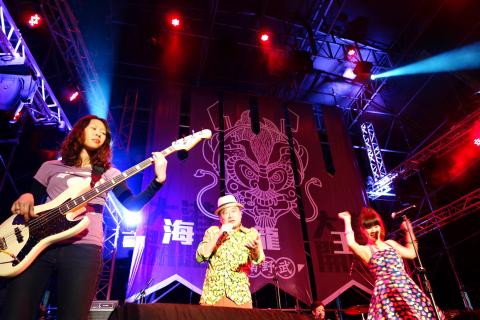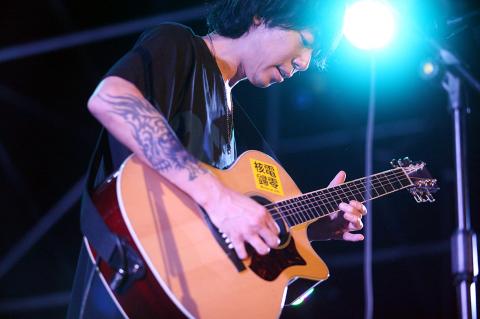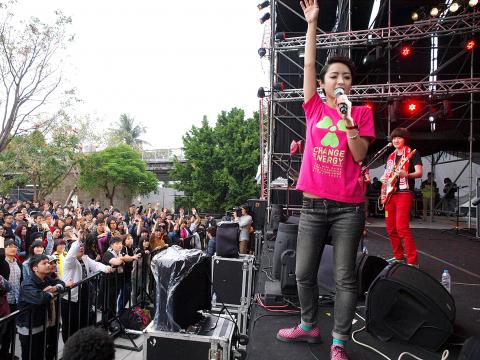Mega Port (大港開唱) has grown up into a real music festival. When it took place last weekend in Kaohsiung, it drew around 20,000 fans over two days to see more than 80 bands on five major stages. When it was founded in 2006, it was mostly a curiosity, an offshoot franchise of the Formoz Festival (野台開唱) for the straggling and dispersed rock fans down south.
In the last two years, it has reached a tipping point, having grown large enough in terms of both attendance and media attention that things just began happening organically. “It was really unexpected, but this year suddenly lots of people began approaching us with ideas, so we were able to add all these new areas,” said Orbis Fu (傅鉛文), CEO of the Mega Port’s parent company, The Wall Music.
As a result, the NGO Village area was bigger than ever. There was an on-site hair salon. There were two new DJ stages, a skateboard area, live graffiti, and an art project of around a hundred lifesize wire figures covered in white plastic — strewn throughout the 2km site, they ruffled in the wind and looked like people in cheap plastic raincoats. Before the fest, there was lots of grumbling about a pop star, Cyndi Wang (王心凌), in this rock fest lineup. Named one of the top ten most popular entertainment celebrities of 2011 by Next Magazine, Wang is a typical product of the Mandopop entertainment-publicity complex. But she at least appeared to embrace the idea of musician-generated music, performing a song with the band Punk Hoo (胖虎) and declaring she hoped to form her own band.

Photo courtesy of The Wall
Anti-nuclear sentiment was ubiquitous. In addition to the stickers, t-shirts and shuffling environmentalist proselytizers, a slew of musicians took up the cause. Bobby Chen (陳昇) exhorted a big, main stage crowd, “Don’t be against nuclear power, get rid of it all together.” Wonfu (旺福), Dog G (大支) and Fire EX (滅火器) also bandied around the cause.
Hotels around the Pier 2 Arts District — at least the cheaper ones — were booked to capacity with rockers from Taipei City. In short, there was drama, a national audience and a great subcultural sampling — all the tiny nuances that add up to a great festival vibe, both on and off the site.
So in a sense, it didn’t matter that the international headliners were sometimes less than inspiring. Grizzly Bear was great for fans of Grizzly Bear, but hardly captivating. The Japanese experimental metal band Boris played a set that was dazed, creepy and extremely loud, but also hard to latch on to. Many said their performance a night before in Taipei was much better. Japanese punkers 10 Feet were, however, rousing, intense and fun.

Photo courtesy of The Wall
Many of the biggest crowds of the festival turned out for local acts. The Sunday night finale by Fire EX saw several thousand flock to the main stage. Veteran rocker/comedian Bobby Chen and the band 1976 were also major draws. Fans had to squeeze in to see Elephant Gym on one of the smaller stages, and deathcore group Side Effect demonstrated a solid following.
If anything, Mega Port seems poised to grow. In the Pier 2 Arts District, an expansive and renovated industrial zone of warehouses and harbor works, is a 10-minute cab ride from the heart of the city, has plenty of space and is relatively insulated from noise complaints. The March weather in Kaohsiung is temperate, dry and — unlike every summer festival in Taiwan — wholly immune from typhoons. One can also surmise that Mega Port has a decent measure of government support. Look for it to be just as good if not better next year.
This weekend in Taipei, the beat goes on with a couple of fun indie shows. A small recording studio in Banciao called Rooftop Audio has over the last couple years recorded some of the most interesting indie acts in Taiwan, including Forests, Sleaze, Hang in the Air and Green! Eyes. Recently, it invited 11 bands to come in and record a single track, and it is releasing the results this weekend as a compilation CD, The Sound of the Rooftop. There will also be a two-day showcase at The Wall with all eleven bands playing.

Photo courtesy of The Wall
Bands include American Muffins (美國大麻煩), Bowztiger (包子虎), Forests (森林合唱樂團), Fruciente (佛香甜 ), Moonteg, Queen Suitcase (皇后皮箱), Sleaze (湯湯水水), The Tic Tac and Windmill (風籟坊).
■ The gigs are tomorrow and Sunday, 8pm to 11pm at the Wall, B1, 200, Roosevelt Rd, Sec 4, Taipei City. Tickets are NT$700 for both days in advance, or NT$500 per day at the door.
Japanese act Killie will play tonight at the invitation of the local label PsychoYouth Records, which specializes in punk, hardcore, emo and screamo. If you like the Japanese group Envy, or the Taiwanese band Human Beings (人), this will be your bag. There will be lots of heavy distortion, top-of-the-lungs venting and a bunch of dudes doing a slow mosh. Support bands include Sleaze, Until Seeing Whales Eyes, Karma Collective and Mr. Dirty.
■ Today at 7:50pm at Pipe Livehouse, 1 Siyuan St, Taipei City (台北市思源街一號). Tickets are NT$400 at the door.

Dissident artist Ai Weiwei’s (艾未未) famous return to the People’s Republic of China (PRC) has been overshadowed by the astonishing news of the latest arrests of senior military figures for “corruption,” but it is an interesting piece of news in its own right, though more for what Ai does not understand than for what he does. Ai simply lacks the reflective understanding that the loneliness and isolation he imagines are “European” are simply the joys of life as an expat. That goes both ways: “I love Taiwan!” say many still wet-behind-the-ears expats here, not realizing what they love is being an

William Liu (劉家君) moved to Kaohsiung from Nantou to live with his boyfriend Reg Hong (洪嘉佑). “In Nantou, people do not support gay rights at all and never even talk about it. Living here made me optimistic and made me realize how much I can express myself,” Liu tells the Taipei Times. Hong and his friend Cony Hsieh (謝昀希) are both active in several LGBT groups and organizations in Kaohsiung. They were among the people behind the city’s 16th Pride event in November last year, which gathered over 35,000 people. Along with others, they clearly see Kaohsiung as the nexus of LGBT rights.

In the American west, “it is said, water flows upwards towards money,” wrote Marc Reisner in one of the most compelling books on public policy ever written, Cadillac Desert. As Americans failed to overcome the West’s water scarcity with hard work and private capital, the Federal government came to the rescue. As Reisner describes: “the American West quietly became the first and most durable example of the modern welfare state.” In Taiwan, the money toward which water flows upwards is the high tech industry, particularly the chip powerhouse Taiwan Semiconductor Manufacturing Co (TSMC, 台積電). Typically articles on TSMC’s water demand

Every now and then, even hardcore hikers like to sleep in, leave the heavy gear at home and just enjoy a relaxed half-day stroll in the mountains: no cold, no steep uphills, no pressure to walk a certain distance in a day. In the winter, the mild climate and lower elevations of the forests in Taiwan’s far south offer a number of easy escapes like this. A prime example is the river above Mudan Reservoir (牡丹水庫): with shallow water, gentle current, abundant wildlife and a complete lack of tourists, this walk is accessible to nearly everyone but still feels quite remote.